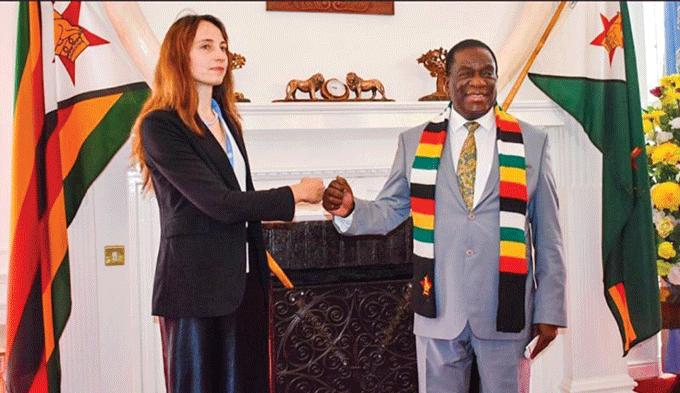
BY MOSES MATENGA THE United Nations special rapporteur has called for an all-stakeholders dialogue to discuss human rights, political reforms and the rule of law in the country and urged the removal of sanctions imposed by the West.
In a statement yesterday after her 10-day visit to assess the impact of sanctions imposed on Zimbabwe, Alena Douhan said sanctions were hitting ordinary Zimbabweans hard and called for dialogue as a solution to the problem.
“The time is ripe for sanctioning States and key national stakeholders to engage in meaningful structured dialogue on political reforms, human rights and the rule of law and abandon the rhetoric on sanctions as an advocacy tool,” Douhan said.
The United States has maintained sanctions on Zimbabwean officials since 2001 while the European Union maintains an arms embargo on the Zimbabwe Defence Industries. In February this year, the United Kingdom slapped sanctions on four Zimbabwean security officials over alleged human rights abuses.
The West has demanded an end to human rights abuses by Harare among the conditions for the lifting of the sanctions which President Emmerson Mnangagwa claims have crippled the country’s economy.
The West, however, say corruption and grand looting, not sanctions, are the cause of Zimbabwe’s economic demise.
“Over the last 20 years, sanctions and various forms of over-compliance with sanctions have had an insidious ripple effect on the economy of Zimbabwe and on the enjoyment of fundamental human rights, including access to health, food, safe drinking water, sanitation, education and employment,” Douhan said.
A statement from the UN Human Rights Special Procedures read in part: “The UN special rapporteur called for the lifting of unilateral sanctions against Zimbabwe and urged meaningful structured dialogue on political reforms, human rights and rule of law.”
- Chamisa under fire over US$120K donation
- Mavhunga puts DeMbare into Chibuku quarterfinals
- Pension funds bet on Cabora Bassa oilfields
- Councils defy govt fire tender directive
Keep Reading
The UN special rapporteur said a detailed report on her findings would be tabled at the Human Rights Council in September next year.
In her preliminary findings, Douhan stated that those living in poverty — women, children and the elderly — were victims of the sanctions.
She and her team met Mnangagwa, ministers, the Speaker of the National Assembly Jacob Mudenda, the opposition and other stakeholders to understand the impact of sanctions on ordinary people.
On Monday, Sadc chairman Zambian President Lazarus Chakwera called for “meaningful and constructive dialogue to consolidate the rule of law, democracy, governance and human rights” in Zimbabwe.
“It is only through such exchanges that better appreciation of concerns of all parties could be secured and progress towards their resolution be achieved,” Chakwera said, urging the West to “support Zimbabwe’s efforts towards implementing her reform agenda”.
MDC Alliance vice-president Welshman Ncube commended Chakwera’s statement.
“For the first time after a long time, Sadc is clearly recognising that the crisis in Zimbabwe is multi-faceted by accepting that her international isolation is a result of bilateral and multilateral disputes that Zimbabwe has with the international community,” Ncube said on Tuesday.
“All along Sadc has supported Zimbabwe for the lifting of sanctions, but it has always been reluctant to accept the core deficit which has resulted in the international isolation.
“It is imperative that we cannot go talking with the Americans, the British and the European Union when we have not talked with ourselves.”
He said the reform agenda should be inclusive and locally grounded.
“We welcome this recognition that there is need for reform in Zimbabwe. Issues around rule of law, deficit on democracy, the deficit on good governance, and the violations of human rights are all captured for the first time in that Sadc statement and we welcome them.”
Follow Moses on Twitter@mmatenga











